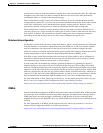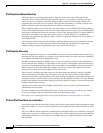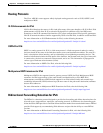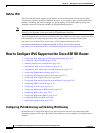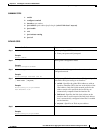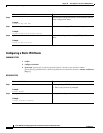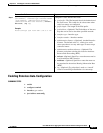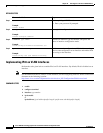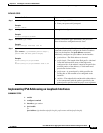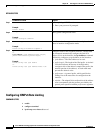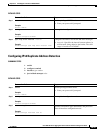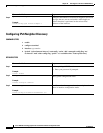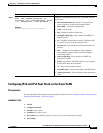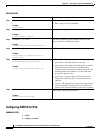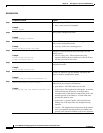
32-13
Cisco ASR 901 Series Aggregation Services Router Software Configuration Guide
OL-23826-09
Chapter 32 IPv6 Support on the Cisco ASR 901 Router
How to Configure IPv6 Support on the Cisco ASR 901 Router
DETAILED STEPS
Implementing IPv6 Addressing on Loopback Interfaces
SUMMARY STEPS
1. enable
2. configure terminal
3. interface type number
4. ipv6 enable
or
ipv6 address {ipv6-address/prefix-length | prefix-name sub-bits/prefix-length}
Command or Action Purpose
Step 1
enable
Example:
Router> enable
Enables privileged EXEC mode.
• Enter your password if prompted.
Step 2
configure terminal
Example:
Router# configure terminal
Enters global configuration mode.
Step 3
interface
type number
Example:
Router(config)# Interface vlan 40
Specifies an interface type and number, and places the
router in interface configuration mode. farce
Step 4
ipv6 enable
or
ipv6 address {
ipv6-address/prefix-length
|
prefix-name sub-bits/prefix-length
}
Example:
Router(config-if)# ipv6 enable
or
Router(config-if)# ipv6 address 2000::1/64
Configures IPv6 on the VLAN interface. Though both the
commands automatically configure the link local address
(LLA) on the interface, the ipv6 address command
additionally configures an ipv6 address on the interface.
• ipv6-address—The IPv6 address to be used.
• prefix-length—The length of the IPv6 prefix. A decimal
value that indicates how many of the high-order
contiguous bits of the address comprise the prefix (the
network portion of the address). A slash mark must
precede the decimal value.
• prefix-name—A general prefix, which specifies the
leading bits of the network to be configured on the
interface.
• sub-bits—The subprefix bits and host bits of the address
to be concatenated with the prefixes provided by the
general prefix specified with the prefix-name argument.



